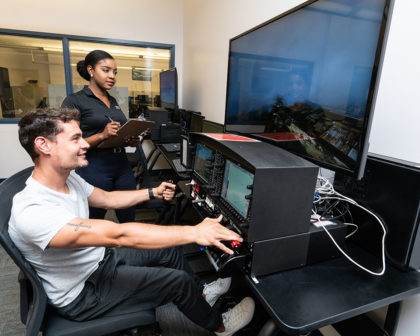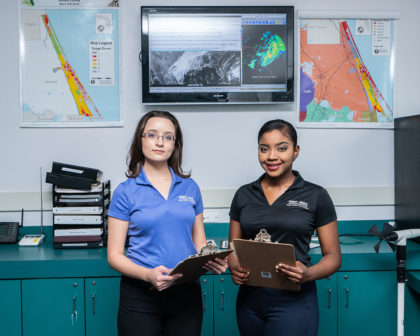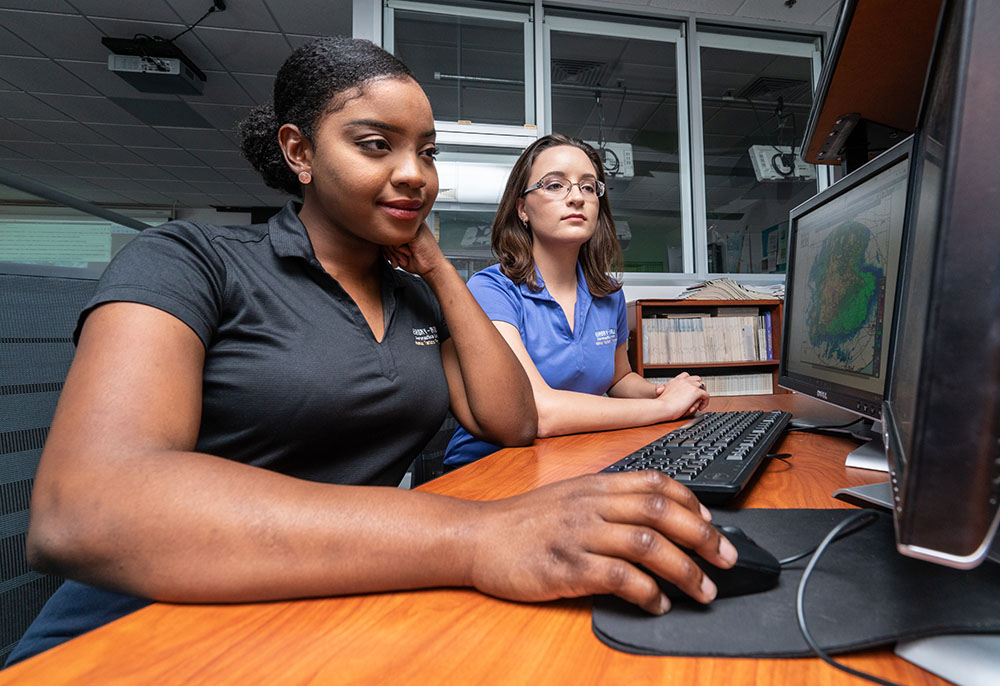Jayde King (’14, ’16, ’20) started her journey as an Eagle as a high school student enrolled in Embry-Riddle’s Gaetz Aerospace Institute. The institute links Embry-Riddle to secondary schools, giving students a jumpstart on their college education through a concurrent enrollment program.
For King that jumpstart was like a rocket, launching her on an upward trajectory that culminated in three degrees and earned her the distinction of being the first Gaetz Institute graduate to complete a Ph.D. at Embry-Riddle. Today, she is a human factors research psychologist at the Air Force Research Laboratory (AFRL).
“I love seeing humans and technology working together,” she says. “That’s my favorite part of human factors.”
Raised in close proximity to space shuttle launches, King says she dreamt of being an astronaut from a young age. Science, technology, engineering and mathematics (STEM) came naturally to her. Her mother is a crime scene investigator, and her father is a math teacher. Her love for aviation grew when she joined the Boynton Aerospace Science Academy (BASA), an arm of Embry-Riddle’s Gaetz Aerospace Institute at Boynton Beach Community High School in South Florida.
“We were able to complete 10 free flight hours through the program,” Kings says. “We got to fly, take aviation maintenance classes — all of that really fed into my decision to go to Riddle and promoted my love for aviation.”
Embry-Riddle Family
At Embry-Riddle, King was an active participant in and out of the classroom. She served on the Student Government Association and was a member of the National Society of Black Engineers (NSBE), among other clubs. She earned a Bachelor of Science in Air Traffic Management in 2014.

She says she found a “family” at Embry-Riddle that encouraged her in her pursuits. “I was able to grow not only as a student, but as a professional and a good citizen.”
Upon completing an internship with Fort Hill Group, a human performance consulting company, and earning a master’s degree in human factors in 2016, King decided to undertake the ultimate academic challenge: earning a Ph.D.
She focused her doctoral research on a major problem facing the general aviation industry: private pilots crashing due to weather-related incidents. A 2016 report published in Physical Geography, found that private pilots account for the majority of fatal general aviation accidents related to weather. With a grant from the Federal Aviation Administration and guidance from professor and program coordinator Elizabeth Blickensderfer, King developed an app to help pilots more easily and effectively access, interpret and respond to weather information in real-time.
Making a Difference for Industry
Before even finishing her program, King accepted her position with the AFRL. A recruiter for the lab offered her a job — on the spot — at a NSBE conference she attended.
King joined the AFRL as a research psychologist in July 2020 and works specifically in the Warfighter Interactions and Readiness Division of the 711th Human Performance Wing at Wright-Patterson Air Force Base in Dayton, Ohio. Her role focuses on making the relationship between humans and artificial intelligence more seamless and less robotic.

Transitioning from a student to a working professional can be challenging, not to mention doing so during a global pandemic. King leans on the lessons she learned at Embry-Riddle that she still uses today.
“Just a couple of months ago I was a student, but now my decisions actually have impact,” she says.
With few women of color pursuing STEM-related careers, King believes that representation and giving back through mentorship are key solutions to diversifying the industry. She also credits the Gaetz Institute program with playing an important role in attracting people of color and women to these fields.
“It gives them the knowledge they need to prepare for this career, exposure to mentors at a young age and the opportunity to see students like them working through that coursework,” she says.
Looking back on her accomplishment, King says it’s not her new title of “doctor” that she values the most, but the collective experience she had at Embry-Riddle and how she can use it to conquer any challenge that comes her way.
“What changed wasn’t the title — what changed was everything I did and learned,” she says. “Research is supposed to increase knowledge and better people’s lives. Now I have the credentials to do it, which is really empowering.”
